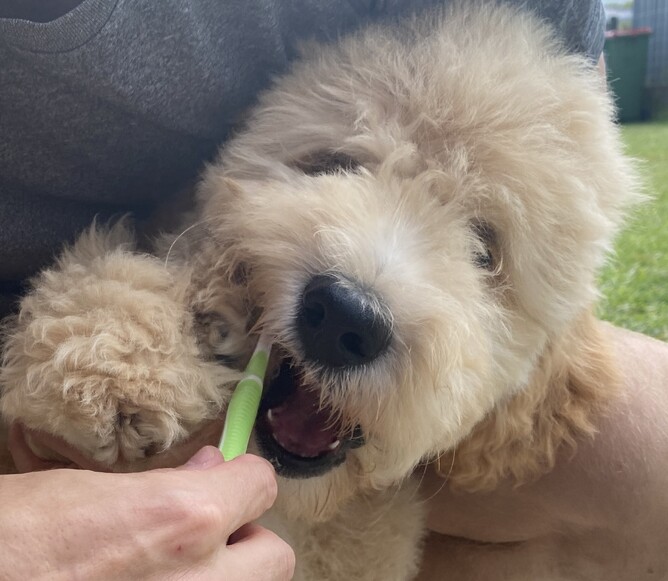Did you know your pet's teeth need the same dental care and attention that you give your own?
Nothing warms your heart more than your happy, smiling dog welcoming you home at the end of the day.
Just like us, to keep that happy smile, cats and dogs rely on healthy teeth and gums for their overall health and wellbeing.
The build-up of dental plaque (a sticky film of bacteria that constantly forms on the teeth) can lead to oral health issues in your pet, such as gingivitis, periodontal disease and tooth loss.
Even relatively young pets can develop dental disease.
According to the American Veterinary Dental Society, more than 80% of dogs and 70% of cats show signs of oral disease by the time they are three years old.
While minor dental disease causes little distress to pets, as it progresses, discomfort and pain develop. This is often not recognised by the owner, due to our animals' ability to mask this pain.
Regular dental care, including brushing and professional cleaning by your vet, is important for preventing dental disease in cats and dogs. We can also take preventive measures, such as daily toothbrushing with pet-safe toothpaste, special dental diets and providing appropriate chew toys or dental treats.
Things you can do at home to look after your furry friends smile:
Regularly cleaning your pet's teeth with a pet-friendly toothbrush and toothpaste will help to prevent plaque and tartar buildup. To get them used to it, start by smearing a dot of toothpaste on your finger and using it to clean their teeth. Once they are used to this you start using a toothbrush.
Dental chews and toys can help keep teeth clean. Some dental treats have additives to help reduce the buildup of plaque and tartar.
Water additives that have been formulated to freshen up your pets’ teeth and help prevent the buildup of plaque and tartar, can be put into your pets’ drinking water.
There are special dental diets that have been formulated to help reduce tartar buildup. These often have larger kibble that helps to mechanically clean the teeth as your pet chews.
Early diagnosis and treatment of dental issues is important.
The earlier they are addressed, the less likely they are to cause permanent damage for the dog or cat. Early treatment is also better for your pet as it is less invasive.
This is also more cost effective for the owner in the long term. By investing in regular dental check-ups and professional cleaning, pet owners can avoid costly dental procedures and other complications that may arise from untreated dental diseases.
How often your pet needs a professional cleaning will depend on your pet. Some dogs require a six-monthly professional clean, while others may only need one every three years. Your vet will be able to advise you on this.
Serious dental issues such as fractured teeth can also be caused by feeding bones or providing chew toys that are too hard. As a good rule of thumb, if you cannot dent it with your fingernail, it is too hard.
By maintaining good oral hygiene in our pets and prioritising regular dental care, we can help them to enjoy a longer, happier and healthier life (and we can enjoy some cuddles without the fear of bad breath!)


